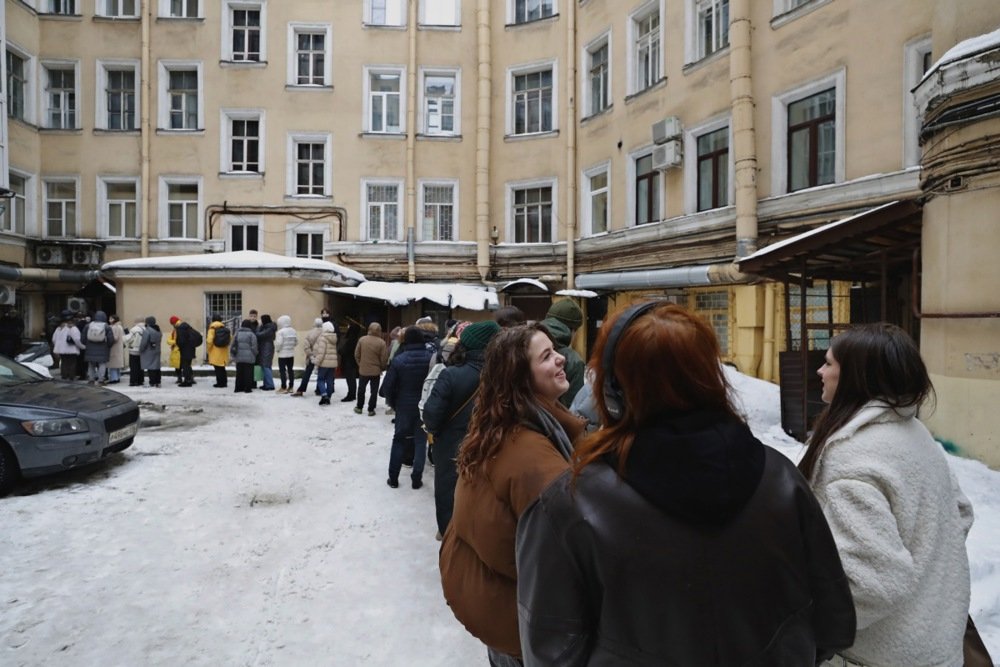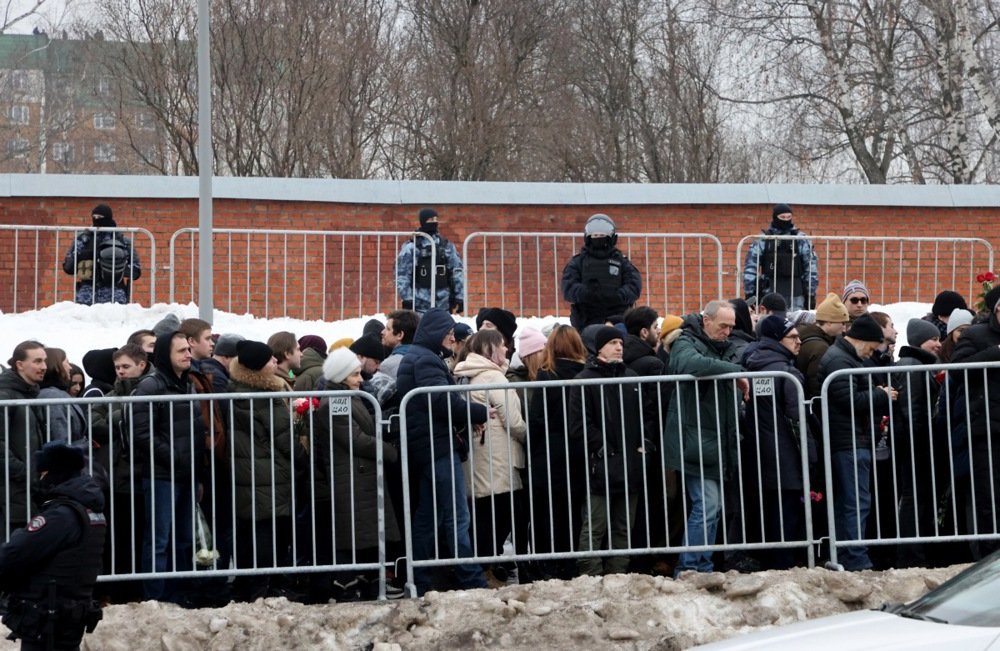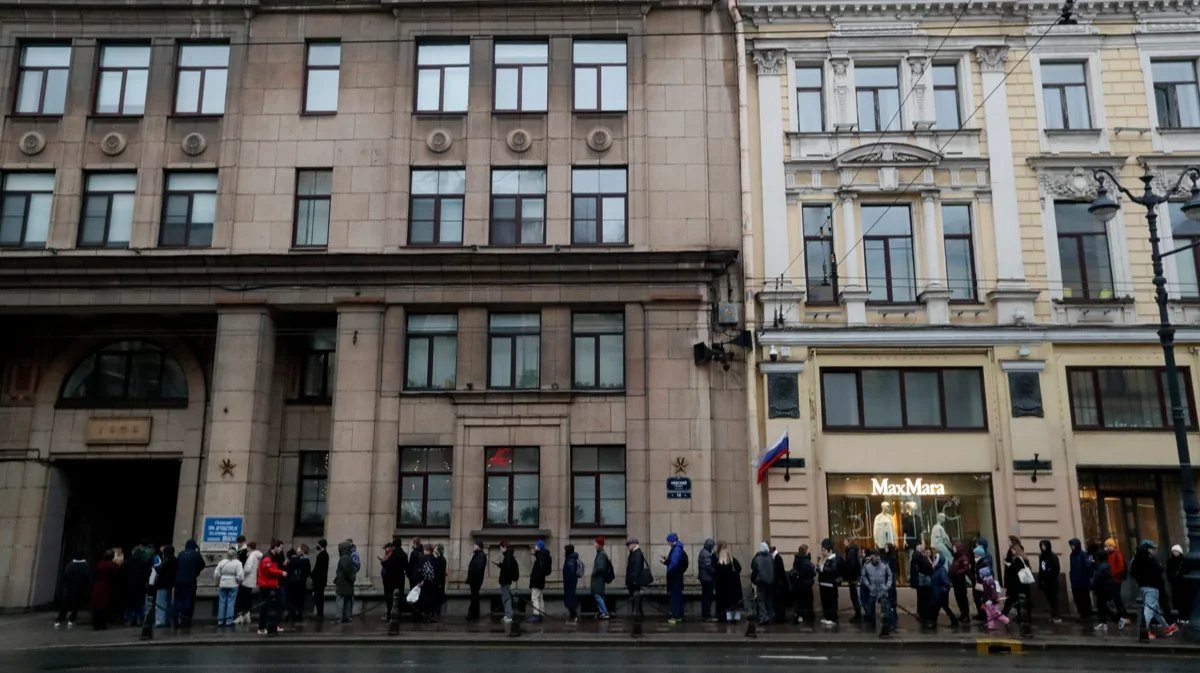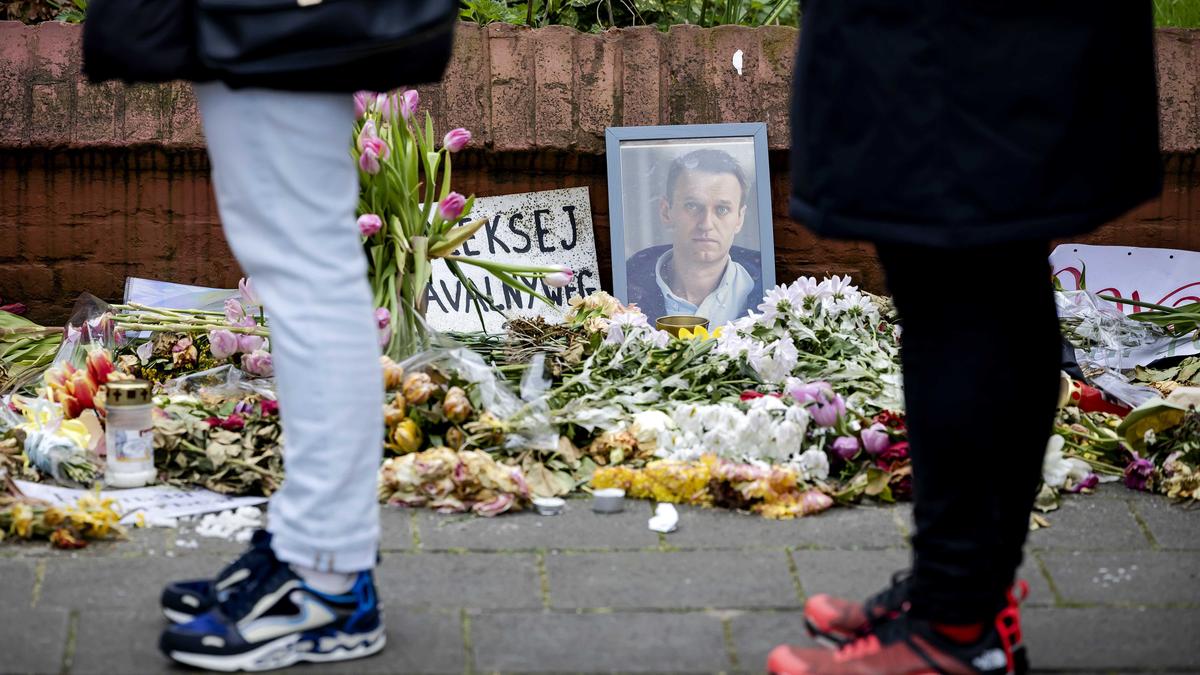Queues have become a symbol of protest in Russia this past year. Despite being unable to express their discontent through mass rallies, Russians have continued to express civil solidarity in other ways. Throughout the year, Russians have queued: to nominate anti-war presidential candidate Boris Nadezhdin, to say their goodbyes to Russian opposition leader Alexey Navalny, and to vote against Vladimir Putin in the March presidential election.
Queues of hope
At the end of 2023, politician Boris Nadezhdin announced his intention to run for president and his nomination was supported by most of Russia’s opposition, including Alexey Navalny’s Anti-Corruption Foundation.
Nadezhdin was the only anti-war presidential candidate to surpass the necessary 100,000 signatures of support and by the end of January, thousands of Russians, both in Russia and abroad, had lined up in the “queue of hope” to support Nadezhdin.
Ivan* came to a regional polling station to sign in support of Nadezhdin’s presidential bid, where he says he met a lot of like-minded people.
The experience gave Ivan hope that Russia “has a chance” at change and that while the country’s future is “bleak”, people can still "light the way”.
“Any way to show up and express your opinion is important," Ivan said, adding that such actions could help “those who feel lost and lonely” in Russia’s current political climate.
The queues are essential for those “who cannot or are afraid to express their position openly and who disagree with the decisions of those in power in Russia”.
Like Ivan, Sergey* also had only positive things to say about his experience queueing. The queue left Sergey feeling inspired as he realised that he was not "alone, or one of five to 10 people, or even several hundred people, but one of thousands”.
Sergey said that he stood in line to express his political opinion “without consequences” as queuing was a legitimate way for Russians to express their civil and political opinions without fearing punishment. In particular, the queues are essential for those “who cannot or are afraid to express their position openly and who disagree with the decisions of those in power in Russia”.
While Sergey acknowledged that the palpable enthusiasm has now dissipated, he still thinks warmly of his time in the "queue of hope”. According to Sergey, the Russian authorities saw the queues and chose not to let Nadezhdin run for president because they felt threatened that he could “post quite a decent result”, even if he couldn’t win.
Russia’s Central Election Commission (CEC) rejected Nadezhdin’s candidacy on 8 February, stating that more than 5% (9,417) of the total signatures signed in his support (105,000) were invalid. Nadezhdin appealed the decision but on 4 March, the Supreme Court recognised the CEC’s decision as legitimate.

People queue up to sign their support for Boris Nadezhdin in St. Petersburg, 23 January 2024. Photo: EPA-EFE/ANATOLY MALTSEV
Navalny’s funeral
Jailed Russian opposition leader Alexey Navalny was killed on 16 February in a penal colony in the Yamalo-Nenets autonomous district in the Russian Arctic and what followed was an unprecedented wave of mourning both in Russia and around the world. The funeral took place on 1 March in Moscow with queues to attend the ceremony stretching kilometres with thousands of people wanting to pay their respects.
According to nonprofit organisation White Counter, at least 16,500 people came to the funeral with the queue to the church stretching more than 1.5 kilometres. People queued for hours to say their goodbyes chanting phrases such as “No to war!”, “Down with the power of murderers!” and “We will not forgive!”
“You move on autopilot and do what you have to do, without thinking about the risk,” Maria*, who attended Navalny’s funeral, recalls.
“You move on autopilot and do what you have to do, without thinking about the risk.”
Pyotr* was also “pleased to see thousands of people united in grief”. For him, it was important to feel support “when it seems that there is no one left in Russia who believes in a future, in a free Russia, the one that Navalny dreamed of”.
However, the funeral was also “depressing” for Pyotr, he says, because “it was hard to believe that it was Navalny; instead of a cheerful person there was a motionless body”.
On the day of Navalny’s funeral, more than 100 people were detained in Moscow and other Russian cities. Despite this, thousands of people continued to come to the cemetery where Navalny was laid to rest for days after the funeral.

Russians gather to pay their respects to Alexey Navalny amid a heavy police presence, 1 March 2024. Photo: EPA-EFE/SERGEI ILNITSKY
Noon against Putin
The mass demonstration Noon against Putin took place on 17 March, the last day of Russia’s presidential elections. The protest brought together thousands of people, both in Russia and abroad.
Former St. Petersburg deputy Maxim Reznik came up with Noon against Putin, the idea being that those who opposed Putin and the Kremlin regime would turn up to election polls at midday local time to form a queue demonstrating their disagreement with Russia’s current government. Inspired by the queues to support Nadezhdin and mourn Navalny, these queues aimed to give Russians hope and prove that they were not alone in their discontent with the current state of Russian politics.
Amina, who lives in a small town in the North Caucasus, said that she felt “no doubt” about going to the polls at noon as it was her “duty”, even though it was unlikely to change anything.
Amina* decided to participate because it was the only relatively safe opportunity for her to express disagreement with the status quo. She said she was “very angry and depressed after Navalny’s death” and wanted to do something.
Amina, who lives in a small town in the North Caucasus, said that she felt “no doubt” about going to the polls at noon as it was her “duty”, even though it was unlikely to change anything and there were rumours that people would be detained for participating.
When Amina arrived at the polling station there were a lot of police around but as she said, “I was ready for this, it didn’t stop me”. The police filmed everything and whispered among themselves, with a plainclothes security officer placed inside the polling station. When Amina came out of the voting booth, the plainclothes officer stood right next to her to see who she had voted for and if she had ruined the ballot.

People queue up to vote at noon in St. Petersburg, 17 March 2024. Photo: Anatoly Maltsev / EPA-EFE
According to Amina, there were very few people at her polling station at noon and she was unsure if they were aware of the protest. Amina said she was surprised to see her neighbour there. “We looked at each other with understanding and smiled; I’m sure she was there for the same reason.”
The Moscow Prosecutor’s Office had warned that Noon against Putin could be deemed an illegal mass event, referring to “signs of extremist activity” in its official statement, thus criminalising its organisers and those who participated.
But that didn’t stop people. While exact numbers are unknown, it is clear that tens of thousands of people took part with queues seen in Moscow, St. Petersburg, Yekaterinburg, Novosibirsk and other big cities. According to human rights group OVD-Info, at least 80 people were detained in 20 cities.
One of the biggest demonstrations abroad took place in the German capital Berlin, with the queue at the Russian Embassy stretching several blocks. The embassy promised to extend its hours to accommodate people queuing to vote but actually closed earlier than scheduled leaving more than 500 in the queue unable to exercise their democratic right. In Riga, many Russian citizens also did not get to vote on time but in Yerevan, polling stations were open until 11pm local time with many standing in line for nine hours.
According to the Vote Abroad project, which calculated the results at polling stations outside of Russia, only 15% of voters at Russian embassies abroad supported Vladimir Putin.
*Not their real names
Join us in rebuilding Novaya Gazeta Europe
The Russian government has banned independent media. We were forced to leave our country in order to keep doing our job, telling our readers about what is going on Russia, Ukraine and Europe.
We will continue fighting against warfare and dictatorship. We believe that freedom of speech is the most efficient antidote against tyranny. Support us financially to help us fight for peace and freedom.
By clicking the Support button, you agree to the processing of your personal data.
To cancel a regular donation, please write to [email protected]

